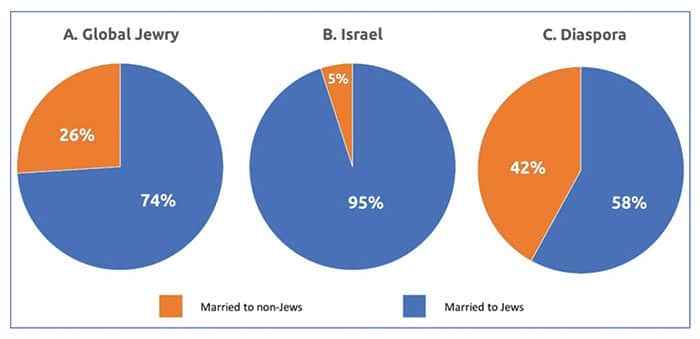 Oleksii Liskonih/Getty Images
Oleksii Liskonih/Getty Images Firas Maksad of the Middle East Institute in Washington opened his remarks in an event last week with a sharp remark: Normalization in Israel-Saudi relations is not a question of if, but a question of “when and how.” This comment indicates an awakening: The American foreign relations community has turned its attention to what is developing in the Washington-Riyadh-Jerusalem axis. It takes the attempts to advance an agreement between Israel and Saudi Arabia seriously. Israel’s much smaller community of foreign policy experts tags along.
But what about the Saudis? They recognize its good timing. Biden is at the very beginning of a long, tough election campaign, against an opponent that already gained bragging rights for a significant achievement: The Abraham Accords. Biden would also like to be able to brag about something. He also needs to keep the Saudis away from China and from Iran. There’s a clear incentive for him to go an extra mile.
Israel also needs an achievement, which could help it get over an internal discord that is tearing it apart. If there’s an agreement with the Saudis, Israel would be able to say, with some justification, that this effectively ends the larger Israeli-Arab conflict (the Palestinian issue then becomes a local land dispute).
Still, Maksad noted that the Saudis are careful with the word “normalization.” They talk about the opportunity for “integration.” A practical approach would be to dismiss such rhetorical difference (tomayto, tomahto), but a more doubtful approach would be to suspect that the Saudis want the gains of intimate relationship, without being seen together in public. Maybe they don’t say “normalization” because normalization has bad PR. Which indicates that they are sensitive to public opinion. If Israel insists on “normalization,” or “peace” – words that have symbolic meaning – it will have to pay the Saudis a premium.
The Saudis want hard currency as a reward for their favors. They are a seller that’s holding a hot merchandise, and the U.S. and Israel are potential buyers. Not that they have nothing to offer in return, they certainly do, but right now it is a seller’s market. The customers are eager to buy, the seller can sell, or wait for a better opportunity. Biden has a clock, and his time might be limited. Netanyahu knows that only an achievement of this magnitude might convince some of the public that he is still a leader “in a different league.” If these two leaders want to buy, the Saudis are ready to sell – for the right price.
What will be the price? Let’s stick to principles rather than the fine details: It would be no less than what the Saudis expect to get from the (possible) next American leader, i.e., Trump, and no less than what they expect to get from the (possible) next Israeli leader, i.e., Benny Gantz. If they are offered less, they’d wait. A Trump and Gantz combo could be a one or two years away. And if this combo doesn’t materialize, what Biden and Netanyahu offer now is likely remain on the table.
So now we must ask: On what terms would a Trump and a Gantz agree? With Trump, it’s always difficult to give an answer. But it’s worth remembering that when Trump advanced the Abraham Accords Israel paid, big time: It had to abandon a plan to annex a chunk on the West Bank. And it’s also worth remembering that Trump keeps an Israeli-Palestinian peace plan in his drawer that he can pull out any time. And it’s worth remembering that members of Netanyahu’s current government rejected Trump’s plan. Finance Minister Bezalel Smotrich said about that “[this] is something that cannot under any circumstances happen”.
So, Netanyahu does not have a government that would agree to a Trump plan, and therefore, it is far from certain that he has a government that would agree to a Mohammed bin Salman plan backed by Biden — which cannot be less attractive than a Trump plan. The Americans might respond to such hurdle by saying “great, so why not have an Israeli unity government.” Alas, that plan has no buyers. Gantz and Yair Lapid would surely vote in favor of an agreement and provide Netanyahu with the necessary majority in the Knesset. But they will not commit to providing him with a safety net against the collapse of his coalition.
If Netanyahu decides to move forward along the Saudi path, and assuming this means significant concessions in Judea and Samaria, he will only be able to do so if he is willing to take a big political risk.
The bottom line is this: If Netanyahu decides to move forward along the Saudi path, and assuming this means significant concessions in Judea and Samaria, he will only be able to do so if he is willing to take a big political risk. He will only be able to do so he decides to bet on a deal even if this means that this could be his final, grandiose, hurrah. Do you think Netanyahu is ready for such sacrifice? Do you think he is ripe to become a political martyr for peace? Maybe he is. But this is not what his actions in the last five years indicate.
Something I wrote in Hebrew
In a long report on interfaith marriage, Daniel Staetsky argued that the differences between communities of Jews “with respect to intermarriage is a spectrum of traditionalism. Jewish populations with the lowest levels of intermarriage are those with the highest levels of traditionalism.” I disagreed:
The authors of the report wrap Israel and the Diaspora in the same package — more tradition, less mixed marriages. This is a correct explanation for any community outside of Israel, and a faulty explanation for Israel. What is holding back mixed marriages in Israel is not the level of tradition, but the demographic situation. Israel is a country with a solid Jewish majority, so most of the available spouses are Jewish, and therefore, in general, all Jews find Jewish spouses.
A week’s numbers
And here are some numbers from the new report (by JPR) “Intermarriage of Jews and non-Jews: The global situation and its meaning”:

A reader’s response:
Barak Hullman wrote: “you misquoted from the Mishna [that] says: “The study of Torah is equal to them all. … First comes the whole list and if you add Torah on top of that, together with all of the above, it’s equal to them all. Without it, it’s not.”
My answer: Here’s Maimonides on the Mishna: “Talmud Torah weighs against everything because … Talmud Torah leads to action.”
Shmuel Rosner is senior political editor. For more analysis of Israeli and international politics, visit Rosner’s Domain at jewishjournal.com/rosnersdomain.























 More news and opinions than at a Shabbat dinner, right in your inbox.
More news and opinions than at a Shabbat dinner, right in your inbox.